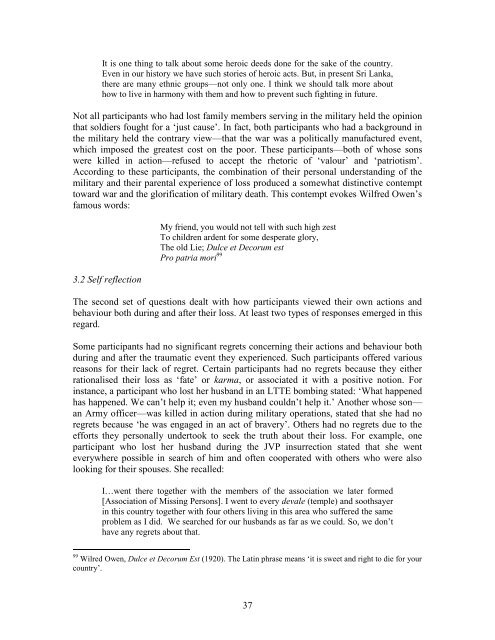Confronting the Complexity of Loss
truth memory justice_final- 11st sep 2015
truth memory justice_final- 11st sep 2015
- No tags were found...
Create successful ePaper yourself
Turn your PDF publications into a flip-book with our unique Google optimized e-Paper software.
It is one thing to talk about some heroic deeds done for <strong>the</strong> sake <strong>of</strong> <strong>the</strong> country.<br />
Even in our history we have such stories <strong>of</strong> heroic acts. But, in present Sri Lanka,<br />
<strong>the</strong>re are many ethnic groups—not only one. I think we should talk more about<br />
how to live in harmony with <strong>the</strong>m and how to prevent such fighting in future.<br />
Not all participants who had lost family members serving in <strong>the</strong> military held <strong>the</strong> opinion<br />
that soldiers fought for a ‘just cause’. In fact, both participants who had a background in<br />
<strong>the</strong> military held <strong>the</strong> contrary view—that <strong>the</strong> war was a politically manufactured event,<br />
which imposed <strong>the</strong> greatest cost on <strong>the</strong> poor. These participants—both <strong>of</strong> whose sons<br />
were killed in action—refused to accept <strong>the</strong> rhetoric <strong>of</strong> ‘valour’ and ‘patriotism’.<br />
According to <strong>the</strong>se participants, <strong>the</strong> combination <strong>of</strong> <strong>the</strong>ir personal understanding <strong>of</strong> <strong>the</strong><br />
military and <strong>the</strong>ir parental experience <strong>of</strong> loss produced a somewhat distinctive contempt<br />
toward war and <strong>the</strong> glorification <strong>of</strong> military death. This contempt evokes Wilfred Owen’s<br />
famous words:<br />
3.2 Self reflection<br />
My friend, you would not tell with such high zest<br />
To children ardent for some desperate glory,<br />
The old Lie; Dulce et Decorum est<br />
Pro patria mori 99<br />
The second set <strong>of</strong> questions dealt with how participants viewed <strong>the</strong>ir own actions and<br />
behaviour both during and after <strong>the</strong>ir loss. At least two types <strong>of</strong> responses emerged in this<br />
regard.<br />
Some participants had no significant regrets concerning <strong>the</strong>ir actions and behaviour both<br />
during and after <strong>the</strong> traumatic event <strong>the</strong>y experienced. Such participants <strong>of</strong>fered various<br />
reasons for <strong>the</strong>ir lack <strong>of</strong> regret. Certain participants had no regrets because <strong>the</strong>y ei<strong>the</strong>r<br />
rationalised <strong>the</strong>ir loss as ‘fate’ or karma, or associated it with a positive notion. For<br />
instance, a participant who lost her husband in an LTTE bombing stated: ‘What happened<br />
has happened. We can’t help it; even my husband couldn’t help it.’ Ano<strong>the</strong>r whose son—<br />
an Army <strong>of</strong>ficer—was killed in action during military operations, stated that she had no<br />
regrets because ‘he was engaged in an act <strong>of</strong> bravery’. O<strong>the</strong>rs had no regrets due to <strong>the</strong><br />
efforts <strong>the</strong>y personally undertook to seek <strong>the</strong> truth about <strong>the</strong>ir loss. For example, one<br />
participant who lost her husband during <strong>the</strong> JVP insurrection stated that she went<br />
everywhere possible in search <strong>of</strong> him and <strong>of</strong>ten cooperated with o<strong>the</strong>rs who were also<br />
looking for <strong>the</strong>ir spouses. She recalled:<br />
I…went <strong>the</strong>re toge<strong>the</strong>r with <strong>the</strong> members <strong>of</strong> <strong>the</strong> association we later formed<br />
[Association <strong>of</strong> Missing Persons]. I went to every devale (temple) and soothsayer<br />
in this country toge<strong>the</strong>r with four o<strong>the</strong>rs living in this area who suffered <strong>the</strong> same<br />
problem as I did. We searched for our husbands as far as we could. So, we don’t<br />
have any regrets about that.<br />
99 Wilred Owen, Dulce et Decorum Est (1920). The Latin phrase means ‘it is sweet and right to die for your<br />
country’.<br />
37



